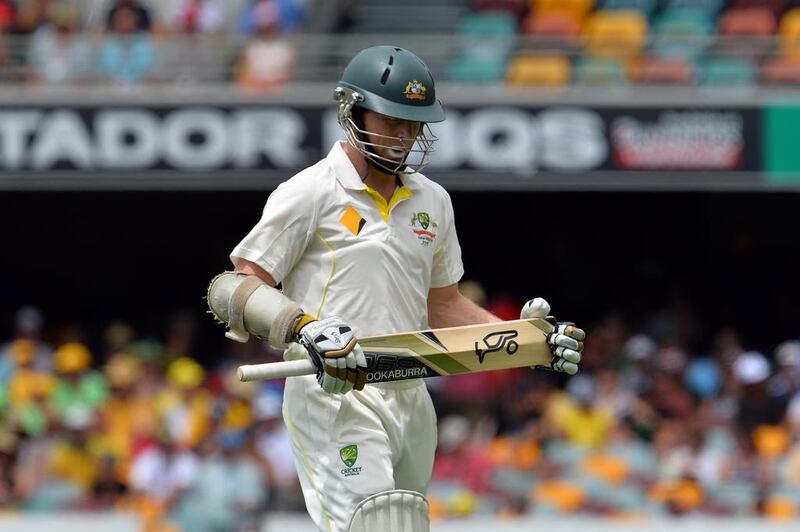Chris Rogers, the scrutinised Australia opener, said on Sunday that more batting failures could result in the end of his Test career.
Australia defeated England by 381 runs in last week’s first Ashes Test in Brisbane, and it was not a good match for Rogers.
Rogers realises that more meagre returns, such as the one and 16 he made, will curtail his Test career.
“I didn’t contribute in the first game as much as I’d like to, so it would be nice to get some runs in this game, for sure,” he said as preparations continue for the second Test in Adelaide, which begins on Thursday.
“You always feel pressure, but you have just got to enjoy it as well. I want to be here the whole [five-Test] series and score runs.
“That is my job, so I probably can’t afford too many failures.”
Rogers, 36, is feeling the heat to perform, as potential replacement Phil Hughes is in the midst of a run-scoring spree in the domestic Sheffield Shield competition.
Hughes has scored a double-century and a century in recent Shield games as he pushes his claim for an Ashes recall after he was dropped after the second Test of the summer in England, following a poor match at Lord’s.
While most of his teammates rested after Australia’s series-opening win, Rogers has been in the nets to prepare for the second Test.
“I have probably hit the ball a bit better,” Rogers said. “I was able to do some good work this week and iron out a few flaws. Hopefully, I can contribute this week.”
Rogers was recalled to the side last summer after previously playing one Test match for Australia, in 2008 against India.
His performances in England were one of the plus points for Australia in their 3-0 series defeat, as he scored 367 runs, averaging 40.7 runs, with a first Test hundred coming at Chester-le-Street.
Rogers has been one of a number of openers used this year, with current partner David Warner, Ed Cowan and Shane Watson having also played there in the past 11 months.
He and Warner had been the preferred choice of Darren Lehmann, the Australia coach, for opening partners, but Lehmann’s patience may be tested if another poor performance happens in Adelaide for the left-hander.
Rogers is expecting the Adelaide wicket to be batsman-friendly.
“I spoke to a few of the South Australian guys, it will be a typical drop-in wicket, I think, not dissimilar to the MCG [Melbourne Cricket Ground], but a bit more flat and that will mean the bowlers will have their work cut out,” Rogers said.
“It would be nice to see a few runs in this game, but also a bit of bounce for our fast bowlers.”
Despite expecting minimal life in the pitch for the bowlers, Rogers said Australia would continue its plans of unsettling England with short-pitched bowling.
“They probably haven’t been challenged like that for a while,” he said of the first Test. And to have someone like Mitch [Johnson] bowling that fast is great for us. Perhaps they were a little bit rattled and we can use that for the rest of the series.”
Rogers also predicted that the sledging between the sides would continue, describing verbal clashes in the first Test as “a lot of fun”.
“It was good that we had the upper hand this time – they got into us in England, so it was probably due some going back to them,” he said.
“But this is another game and they’re going to come hard, so I expect some verbals from them.
“It may have been blown out of proportion a little bit. I think England would understand it happens in a game, all is fair out there.
“We felt after England, it was a chance for us to say something back and that is what happened.”
Meanwhile, James Anderson plans to keep applying the verbal pressure, and insists he has no problem with anything said to him by the Australians so far during the Ashes.
Michael Clarke, the Australia captain, was disciplined for telling Anderson he should get ready for a broken arm when facing Mitchell Johnson in the first Test in Brisbane, where England suffered a 381-run defeat.
While Anderson said the atmosphere at the Gabba was one of the most hostile he has experienced, he does not expect – or want – anything to change for the rest of the series.
“I have absolutely no problem about any of what the Australians were doing on the field,” he wrote in his column in the Mail on Sunday. “I probably dish it out more than most in the field, so I generally get it back more than most. I expect it and accept it.”
Anderson claimed sledging was a skill and a key part of what made him the bowler he is today.
“I try to get myself into a battle,” he said. “It heightens my concentration. Certainly in the past few years, I think I’ve developed it as a skill and it has helped me take the wickets that I have.”
The level of sledging has come under scrutiny following Clarke’s comments, which were picked up by a network microphone, and Jonathan Trott’s departure from the Tour following the opening Test with a stress-related illness.
Anderson admits he had a moment’s pause, but resolved to continue.
“Sometimes, certainly after the game with what happened with Jonathan Trott, you sit down and think, is it actually that important?” he said.
“But when you’re out there and batting, all you are concentrating on is trying to win the game and, in this case, one of the most important series in our careers.”
sports@thenational.ae





